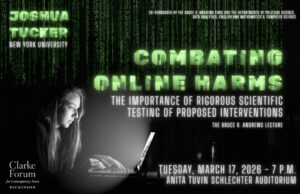Upcoming Program: Tuesday, March 17, 2026
 Anita Tuvin Schlechter Auditorium, 7 p.m.
Anita Tuvin Schlechter Auditorium, 7 p.m.
Bruce R. Andrews Lecture
Combating Online Harms: The Importance of Rigorous Scientific Testing of Proposed Interventions
Joshua A. Tucker is Director of the Jordan Center for Advanced Study of Russia, Co-Director of the Center for Social Media and Politics, and Professor of Politics at New York University
In the digital information era, policymakers and technology companies have implemented numerous interventions designed to mitigate online harms, ranging from misinformation to political polarization. However, Professor Joshua A. Tucker argues that we cannot rely on the assumption that these “common sense” solutions are effective; instead, they must be subjected to rigorous scientific testing. Drawing on extensive research from NYU’s Center for Social Media and Politics (csmapnyu.org), Tucker will present findings from three major studies that challenge conventional wisdom. First, he will demonstrate how the popular advice to “do your own research” via search engines can paradoxically increase belief in misinformation due to low-quality search results. Second, he will discuss the limitations of source credibility labels, which appear to have little impact on downstream news consumption or trust in media. Finally, he will review the results of the U.S. 2020 Facebook & Instagram Election Study, which found that altering feed algorithms to reduce virality or like-minded content did not reduce political polarization. The lecture will conclude by examining the emerging challenges of Generative AI and the “Liar’s Dividend”—the danger that skepticism of fake content will lead citizens to doubt the truth—emphasizing the critical need for data access to understand the evolving threats to democracy.
This program is presented by the Clarke Forum for Contemporary Issue and the Bruce R. Andrews Fund and co-sponsored by the departments of political science, data analytics, English and mathematics & computer science. In addition, this program was initiated by the Clarke Forum’s student project managers.
Topic overview written by Bella Lapp ’26
Biography (provided by the speaker)
 Joshua A. Tucker is Julius Silver, Roslyn S. Silver, and Enid Silver Winslow Professor, director of the Jordan Center for Advanced Study of Russia, co-director of the Center for Social Media and Politics (csmapnyu.org), and professor of politics at New York University.
Joshua A. Tucker is Julius Silver, Roslyn S. Silver, and Enid Silver Winslow Professor, director of the Jordan Center for Advanced Study of Russia, co-director of the Center for Social Media and Politics (csmapnyu.org), and professor of politics at New York University.
His research originally examined mass political behavior in post-communist countries, but for the past dozen years he has focused on the intersection of the digital information environment, social media, and politics. An internationally recognized scholar, he has given over 250 invited research presentations at top domestic and international universities and research centers. His research has been published in top general scientific journals, including Science, Nature, and Proceedings of the National Academy of Sciences, and political science journals, including the American Political Science Review, the American Journal of Political Science, and The Journal of Politics. His most recent books are the co-authored Communism’s Shadow: Historical Legacies and Contemporary Political Attitudes (Princeton University Press, 2017) and the co-edited Social Media and Democracy: The State of the Field (Cambridge University Press, 2020).
He is the co-chair of the external academic team for the U.S. 2020 Facebook & Instagram
Election Study, serves on the advisory board of the Comparative Study of Electoral Systems and numerous academic journals, served for a dozen years on the advisory board of the American National Election Study, and was the co-founder and co-editor of the Journal of Experimental Political Science. He spent over a decade writing and editing the award winning politics and policy blog The Monkey Cage – hosted for much of that time at The Washington Post – and is currently a contributor to the Brookings Institute’s “Economics of AI” series. He is currently the co-chair of the American Political Science Association’s Presidential Task Force on AI and Politics. In 2024 and 2025, he was included in Clarivate’s 1% Top Cited List for the top cited researchers globally by field.
Related Links
https://www.youtube.com/watch?v=28vqMDVhgkA
https://www.youtube.com/watch?v=dVBNugdITRY
https://csmapnyu.org/impact/news/platform-independent-experiments-on-social-media
The Bruce R. Andrews Lecture
Until he passed away on January 8, 2005, Bruce R. Andrews was Robert Blaine Weaver Professor Emeritus of Political Science. Bruce taught at Dickinson from 1960 until his retirement in 1992. Recipient of The John J. Curley and Ann Conser Curley Faculty Chair in 2003, Bruce was one of the college’s most distinguished and influential professors in the last 50 years. Bruce was loved and respected by students, colleagues on the faculty and staff, and many friends he and his wife Margery and children Stephen, Mary-Margaret and Carolyn had and have in the Carlisle community. His warm and engaging personality, deep knowledge of American politics, commitment to the liberal arts and active role as a citizen brightened and informed everything he did at Dickinson. As a living memorial to the example Professor Andrews set as a teacher, mentor and friend, those who knew him have endowed the Bruce R. Andrews Fund to continue the kind of vibrant discussion of politics and public life to which Bruce devoted his life.
